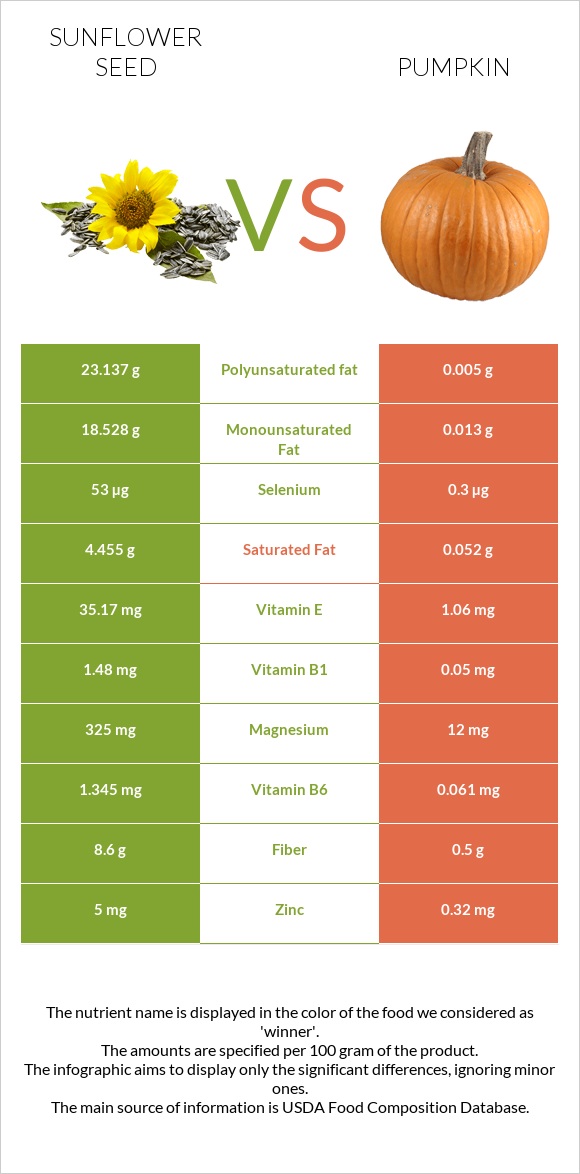Sunflower seeds vs. Pumpkin — In-Depth Nutrition Comparison
Compare
How are sunflower seeds and pumpkins different?
- Sunflower seeds are higher in vitamin E, copper, vitamin B1, vitamin B6, selenium, phosphorus, manganese, magnesium, and iron; however, pumpkins are richer in vitamin A.
- Daily need coverage for vitamin E for sunflower seeds is 229% higher.
- Sunflower seeds contain 265 times more selenium than pumpkins. While sunflower seeds contain 53µg of selenium, pumpkins contain only 0.2µg.
- Sunflower seeds have a lower glycemic index (20) than pumpkins (52).
Seeds, sunflower seed kernels, dried and Pumpkin, cooked, boiled, drained, without salt are the varieties used in this article.
Infographic

Infographic link
Mineral Comparison
Mineral comparison score is based on the number of minerals by which one or the other food is richer. The "coverage" charts below show how much of the daily needs can be covered by 300 grams of the food.
| Contains more MagnesiumMagnesium | +3511.1% |
| Contains more CalciumCalcium | +420% |
| Contains more PotassiumPotassium | +180.4% |
| Contains more IronIron | +821.1% |
| Contains more CopperCopper | +1878% |
| Contains more ZincZinc | +2073.9% |
| Contains more PhosphorusPhosphorus | +2100% |
| Contains more ManganeseManganese | +2091% |
| Contains more SeleniumSelenium | +26400% |
| Contains less SodiumSodium | -88.9% |
Vitamin Comparison
Vitamin comparison score is based on the number of vitamins by which one or the other food is richer. The "coverage" charts below show how much of the daily needs can be covered by 300 grams of the food.
| Contains more Vitamin EVitamin E | +4296.3% |
| Contains more Vitamin B1Vitamin B1 | +4674.2% |
| Contains more Vitamin B2Vitamin B2 | +355.1% |
| Contains more Vitamin B3Vitamin B3 | +1918.2% |
| Contains more Vitamin B5Vitamin B5 | +462.2% |
| Contains more Vitamin B6Vitamin B6 | +2956.8% |
| Contains more FolateFolate | +2422.2% |
| Contains more Vitamin CVitamin C | +235.7% |
| Contains more Vitamin AVitamin A | +9500% |
| Contains more Vitamin KVitamin K | +∞% |
All nutrients comparison - raw data values
| Nutrient |  |
 |
DV% diff. |
| Vitamin E | 35.17mg | 0.8mg | 229% |
| Copper | 1.8mg | 0.091mg | 190% |
| Polyunsaturated fat | 23.137g | 0.004g | 154% |
| Vitamin B1 | 1.48mg | 0.031mg | 121% |
| Vitamin B6 | 1.345mg | 0.044mg | 100% |
| Selenium | 53µg | 0.2µg | 96% |
| Phosphorus | 660mg | 30mg | 90% |
| Manganese | 1.95mg | 0.089mg | 81% |
| Fats | 51.46g | 0.07g | 79% |
| Magnesium | 325mg | 9mg | 75% |
| Iron | 5.25mg | 0.57mg | 59% |
| Folate | 227µg | 9µg | 55% |
| Vitamin B3 | 8.335mg | 0.413mg | 50% |
| Monounsaturated fat | 18.528g | 0.009g | 46% |
| Zinc | 5mg | 0.23mg | 43% |
| Protein | 20.78g | 0.72g | 40% |
| Vitamin A | 3µg | 288µg | 32% |
| Fiber | 8.6g | 1.1g | 30% |
| Calories | 584kcal | 20kcal | 28% |
| Vitamin B2 | 0.355mg | 0.078mg | 21% |
| Saturated fat | 4.455g | 0.037g | 20% |
| Vitamin B5 | 1.13mg | 0.201mg | 19% |
| Potassium | 645mg | 230mg | 12% |
| Choline | 55.1mg | 6.2mg | 9% |
| Calcium | 78mg | 15mg | 6% |
| Carbs | 20g | 4.9g | 5% |
| Vitamin C | 1.4mg | 4.7mg | 4% |
| Vitamin K | 0µg | 0.8µg | 1% |
| Net carbs | 11.4g | 3.8g | N/A |
| Sugar | 2.62g | 2.08g | N/A |
| Sodium | 9mg | 1mg | 0% |
| Tryptophan | 0.348mg | 0.009mg | 0% |
| Threonine | 0.928mg | 0.021mg | 0% |
| Isoleucine | 1.139mg | 0.023mg | 0% |
| Leucine | 1.659mg | 0.034mg | 0% |
| Lysine | 0.937mg | 0.039mg | 0% |
| Methionine | 0.494mg | 0.008mg | 0% |
| Phenylalanine | 1.169mg | 0.023mg | 0% |
| Valine | 1.315mg | 0.025mg | 0% |
| Histidine | 0.632mg | 0.011mg | 0% |
| Omega-3 - EPA | 0.014g | 0g | N/A |
Macronutrient Comparison
Macronutrient breakdown side-by-side comparison
Protein:
20.78 g
Fats:
51.46 g
Carbs:
20 g
Water:
4.73 g
Other:
3.03 g
Protein:
0.72 g
Fats:
0.07 g
Carbs:
4.9 g
Water:
93.69 g
Other:
0.62 g
| Contains more ProteinProtein | +2786.1% |
| Contains more FatsFats | +73414.3% |
| Contains more CarbsCarbs | +308.2% |
| Contains more OtherOther | +388.7% |
| Contains more WaterWater | +1880.8% |
Fat Type Comparison
Fat type breakdown side-by-side comparison
Saturated fat:
Sat. Fat
4.455 g
Monounsaturated fat:
Mono. Fat
18.528 g
Polyunsaturated fat:
Poly. Fat
23.137 g
Saturated fat:
Sat. Fat
0.037 g
Monounsaturated fat:
Mono. Fat
0.009 g
Polyunsaturated fat:
Poly. Fat
0.004 g
| Contains more Mono. FatMonounsaturated fat | +205766.7% |
| Contains more Poly. FatPolyunsaturated fat | +578325% |
| Contains less Sat. FatSaturated fat | -99.2% |





